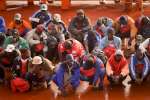Restoring self-reliance among Sahrawi refugees in Algeria
News Stories, 30 January 2014
TINDOUF, Algeria, January 30 (UNHCR) – Five camps the size of small cities emerge from the western Algerian desert, home to Saleh Sidi Mustafa and tens of thousands of other Sahrawi refugees. The first arrived in this vast terrain a decade before 28-year-old Saleh was born, fleeing the conflict that spilled out of Western Sahara.
The vast, empty landscape – "you turn right, you see the sky and an endless horizon," says Saleh, "you turn left, it is the same scene" – mirrors the frustration and limited prospects that too many young Sahrawis feel.
Saleh, one of many talented Sahrawi youths in Tindouf, has mastered Arabic, English, Spanish and German as well as Hassaniya, the Arabic dialect widely spoken in Western Sahara and Mauritania. Saleh took his primary education in the Sahrawi refugee camps before completing his secondary education in Libya and a degree in English literature in Algiers.
"If there is one thing I would like to do, it is to make myself useful to my people and my society," Saleh says. He worked for a year as a teacher in Laayoune camp, receiving US$40 a month. "What can I do with this? I spent it in less than one week. It is far from sufficient to help me and my family. So I went looking for something else."
Like Saleh, other Sahrawis educated abroad rarely find jobs to use their skills. The camps largely subsist on foreign aid and most economic activity is informal, with small markets dotting the camps. Most refugees buy on credit.
"This is part of the Sahrawi culture," explains Mohammed, a 24-year-old working in a market in Awsard camp. "I cannot say 'no' to someone who wants to eat some bread and fruit." Sahrawis like Mohammed struggle, developing businesses that never seem to survive. They emerge, only to vanish as quickly.
The limited opportunities to work leads to accumulated frustration and disillusionment, triggering a sense of helplessness and dependence on aid. According to the director of a vocational and production centre in Dakhla camp, it is becoming harder to motivate youths to even seek employment; they work for two or three weeks, then quit.
"We need to organize workshops focusing on behavioural change," says Yassin*, a supervisor from the youth centre. He sees this as the only way to shift from over-reliance on outside help. "We need to move from a welfare mentality to a culture of work and productivity."
Youth are an estimated 60 per cent of the Sahrawi refugee population (estimates of the population range from 90,000 to 165,000) but live in limbo, with extremely limited chances to apply their education and skills. "There is a rise in petty crimes in the camp and there is a higher rate of absenteeism in classes," Yassin laments. "Young generations are slipping away and we need to address their needs as soon as possible."
Recently a 20-member donor delegation visited the Sahrawi refugee camps, organized by the UNHCR office in Algiers together with WFP and UNICEF. Discussion groups were held with young men and women to provide a first-hand account of the challenges they face. Increased opportunities for self-reliance were emphasized.
"We are calling on the international community, including humanitarian and development actors, to work together on a livelihoods strategy that will strengthen the resilience and self-reliance of Sahrawi refugees, in order to give them back their dignity and some prospects for the future," said Ralf Gruenert, UNHCR Representative in Algeria.
"We need to look at delivering aid while developing community structures. How can we incorporate elements of development into humanitarian assistance operations?" asks Gruenert. "Our aim is to increase the resilience of the communities through creativity to deter dependency on assistance and establish an economy that is self-sustainable."
Self-reliance activities could help reinvigorate the youth of the Sahrawi camps, especially if coupled with Yassin's proposal for initiatives to change behaviour. And people like Saleh have an important role to play as leaders in their community.
"I was able to secure my higher education in order to have better options for my future. But not everybody in the camps has this chance. We represent 10 percent and should be the leading force to lift the rest up," said Saleh, who is about to do a masters degree in Frankfurt. "I will go back better equipped to help my community grow stronger."
* Name changed for protection reasons
By Dalia Al Achi in Tindouf, Algeria





































